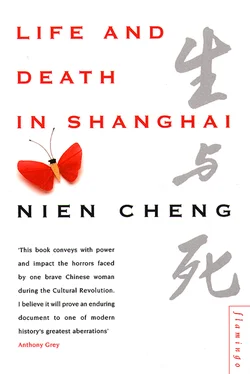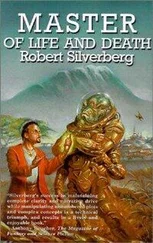The room was arranged differently. Instead of rows of chairs facing the platform, seats were put in an irregular circle. I was told to stand in the middle, with a Red Guard on each side. The man with the tinted glasses was quite a fluent speaker. He, too, started with the opium war, giving a vivid description of how the invading fleet of Britain bombarded the Chinese coast. His account, full of inaccuracies, aimed at creating hatred for me, made me personally guilty for Britain’s action against China over a hundred years ago. He spoke as if it was I who led the British fleet up the Pearl River. Then he declared that Shell was a multinational firm with branches in all parts of the world. He said that Lenin had stated that such companies were the worst enemies of socialism. He told the audience that from time immemorial Shell had sent salesmen deep into the rural areas of China to gather information useful to the imperialists under the pretence of selling kerosene to the peasants. He also gave figures to show the enormous profit the company had made with its China trade and called it the ‘commercial exploitation of the Chinese people’. He told the audience that the British imperialists were more subtle than the Americans. While the United States Government openly opposed the People’s Government of China and protected the Kuomintang in Taiwan, the British gave the People’s Government diplomatic recognition while voting with the United States at the United Nations to prevent the People’s Government from taking China’s seat as its representative.
He turned to an account of my family background, telling the audience that I was the descendant of a big landlord family which owned ten thousand mu of fertile agricultural land (there are roughly 6 mus to an acre). Unlike the liaison officer of the Municipal Government who had said my grandfather was a patriot, he now told the audience that my grandfather was a dirty landlord and an advocate of feudalism because in the history books he wrote he praised several Emperors. Furthermore, he said, evidence had been found among papers left by him that he was a founder and shareholder of the Han Yeh Ping Steel Complex, which included the An Yuan coal-mine where the Great Leader Chairman Mao once personally organized the workers in their struggle against the capitalists. This accusation was supposed to give concrete proof that my grandfather and Chairman Mao were on opposing sides; in fact, the two men belonged to two different generations. He went on to say that my father was a senior official of the Peking Government and spent many years in Japan in his youth. He reminded everyone that Japan had been guilty of aggression against China and in eight years of war and occupation had killed ten million innocent Chinese men, women and children. Carefully he avoided mentioning that my father went to Japan in the early years of this century long before the Japanese invasion of China in 1937; instead he tried to create the impression that my father went to Japan in spite of what Japan did to China. Pointing at me, he said that I went to England when I was twenty years old and was trained by the British to be ‘a faithful running dog’ in one of their universities. My late husband was described as a ‘residue of the decadent Kuomintang regime’ who was fortunate to have died so that he escaped judgement by the Revolutionaries.
Throughout his speech, the audience showed their support and agreement by shouting slogans. Added to the usual slogans of the Cultural Revolution there were a number accusing me of being a ‘spy’ who conspired with foreign powers against China and others simply denouncing me as a ‘running dog’ of the British.
When he had finished speaking, the Red Guard who had led the other Red Guards into my house shouted into the microphone a description of the ‘luxury’ of my home. Another Red Guard told how I had tried to ‘undermine’ their ‘revolutionary activities’ by fighting with them to preserve ‘old culture’. A Revolutionary spoke of my stubborn arrogance and accused me of deliberately keeping a ‘wild animal’ in the house to wound the Revolutionaries.
Members of the ex-staff of Shell were then called upon to provide further evidence against me. I could easily see how frightened they all were and I wondered what they must have gone through. The men who got up to speak were white and their hands holding the prepared statements shook. None of them looked in my direction. There was very little substance in what they said, but every sentence they uttered contributed to the picture that I enjoyed a warm and friendly relationship with the British residents in Shanghai. A web of suspicion was carefully woven. One of the office lift operators declared that the British manager always stepped aside to let me get into the lift before him. A driver testified that whenever the manager and I shared a car, the manager always allowed me to get in first. This was supposed to demonstrate my value and importance to the ‘British imperialists’ because in Communist China a senior man would not dream of letting his female assistant get into a car or a lift before him.
Other members of the staff spoke of files kept in a room next to the manager’s office, not accessible to anyone but the manager and myself. A senior member of the staff who had been with Shell for many years said that maps of geological formation of areas of China with possible oil deposits were routinely kept at the office because they were of value to the imperialists. Another speaker read out excerpts allegedly taken from reports written by Shell branch managers in other parts of China during the time of the Civil War (1946-9) when the armies of the Kuomintang and the Communists were locked in a bitter struggle. Troop deployments of both sides were mentioned in these reports. This was supposed to repudiate my claim that Shell was interested only in commerce.
My late husband came in for severe criticism too. It was alleged that whenever the interest of Shell clashed with the interest of the State, both my husband and I stood on the side of Shell. All the statements were a mixture of fact and fiction, misrepresentation and exaggeration, calculated to mislead the ignorant minds of the gullible and the uninformed.
The meeting dragged on. Night had long ago descended on the city. But the drama of my misfortune was so absorbing that none of the Red Guards or the Revolutionaries left the room. The majority of them, I thought, were stunned by what they believed to be an exposure of a real international spy. Others simply had to pretend to believe in the allegations. I could see that the men who were running the show were gloating with success.
Years later, I was to learn that the date of this struggle meeting had been postponed several times because the organizers had hoped to get my daughter to take part in my denunciation. Despite enormous pressure, she refused repeatedly. But National Day, October the First, was approaching. The Maoists leaders ordered the Revolutionaries in Shanghai to produce concrete results to celebrate the day in a mood of victory. It was in response to this order that the men in charge of my case decided to hold the meeting without my daughter.
When the man with the tinted glasses judged that sufficient emotion had been generated among those present, he complimented the men and women who took part in my denunciation for their high level of socialist awareness. He also had a good word to say for our former staff members declaring that most of them had emerged from their re-education with clearer heads. But he issued a warning to those whose heads were still foggy, calling upon them to redouble their efforts at self-criticism to shake off the shackles of capitalism.
Turning to me, he said, ‘You have listened to the mountain of evidence against you. Your crime against the Chinese people is extremely serious. You can only be reformed by giving a full confession telling us how you conspired with the British imperialists in their scheme to undermine the People’s Government. Are you going to confess?’
Читать дальше












